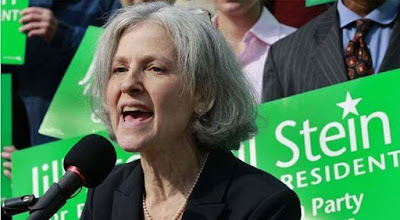The recount headed by Green Party presidential candidate
Jill Stein (who received less than one percent of the vote) in
Wisconsin, Michigan and Pennsylvania is in full swing. Michigan has begun its
recount despite the attorney general’s lawsuit to prevent the recount from
happening. The date for the results to be in [at its latest] is December 19th
due to a law that requires states to finish recounts after no more than 35 days
after the election and it’s coming up fast.
a number of Green Party officials have made their opposition to Stein’s efforts to challenge the vote.
Maryland Green Party US Senate candidate Margaret Flowers’ website questions the motivation of the recount headed by Stein:
“The recount has created confusion about the relationship between the Green and Democratic parties because the states chosen for the recount are only states in which Hillary Clinton lost.” I myself have argued this point many times to no avail.
Flowers continues, “There were close races in other states such as New Hampshire and Minnesota where Clinton won, but which were not part of the recount. And this recount does not address the disenfranchisement of voters; it recounts votes that were already counted rather than restoring the suffrage of voters who were prevented from voting.”
 |
| Jill Stein 2016 Election for President |
A quick recap of the votes in these three states: according
to USA Today, Trump leads by 10,704 votes in Michigan, 70,638 votes in
Pennsylvania, and 22,177 votes in Wisconsin.
The question on everybody’s mind is “what if Trump loses the
recount?” First off, if one state declares Clinton the winner it won’t make a
difference, she would have to win all three states. Winning all three states
would give Clinton 278 electoral votes to Trump’s 260 —a 270-vote majority from
the 538 Electoral College votes is all that is needed to win the presidency.
Neither Adams nor Jackson received the 131 electoral-vote majority then needed to be declared president.
The decision was left up to the House, which elected John Quincy Adams via the 12th Amendment.
Ratified in 1804, established by Article II, Section 1, Clause 2 of the U.S. Constitution and modified by the 12th and 23rd Amendments clarified the process for selecting the president and vice president during an election. Under the 12th Amendment, the House of Representatives elects the president and vice president if no candidate receives the necessary majority of Electoral College votes.
So the decision would be left up to congress. The House of Representatives has a Republican majority so naturally they would vote in their best interest and stand behind Trump.
What if the electors change their minds and cast their votes for Clinton instead of Trump? By the end of the election Trump had 306 electors to Clinton’s 232. With this being the case, it would take more than one or two or even three electors to change the outcome, it would take 37 electors.
There is no federal penalty for choosing to award an Electoral College vote to a different candidate – however, many individual states have legislated against it. There are about 30 of the 50 states plus the District of Columbia that have passed laws "binding" their electors to vote in accordance with the presidential popular vote in their state. If they don’t comply? The elector will pay a $1,000 fine.
There have been 179 faithless electors, over 22 US general elections. A large proportion of these (71) are electors who changed their vote because the candidate they were pledged to died. The latest being in 2004 in the Democratic race between John Kerry and John Edwards. A Minnesota elector (all electors cast secret ballots), pledged for Democrat John Kerry cast [his or her] presidential vote for John Edwards.